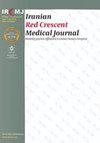医务人员新冠肺炎相关心理症状综合筛查及评估
IF 0.2
4区 医学
Q3 MEDICINE, GENERAL & INTERNAL
引用次数: 0
摘要
背景:考虑到新冠肺炎大流行的流行范围和已知与感染相关的心理后果,似乎有必要提供一种筛查工具,以确定医疗保健部门人群中是否存在心理症状,从而进行预防和及时提供心理干预。目的:本研究旨在设计和标准化综合筛查测试,并评估与COVID-19相关的心理症状的临床方面。方法:这是一项基于描述性调查的研究。这项研究分两个阶段进行。统计人群包括2021年在Ardabil(伊朗)医院新冠肺炎护理病房工作并与这些患者直接接触的所有医生、护士和工作人员。第一阶段共有200名参与者,第二阶段共有98名参与者是通过有目的的抽样方法选出的。最初的研究人员制作的问卷分别用于评估第一阶段和第二阶段八类和七类参与者的心理症状。使用SPSS26和R软件对数据进行分析。结果:德尔菲法和二阶验证性因素分析验证了问卷的有效性。与测量第一阶段问卷可靠性相关的研究结果表明,尽管基于评分者间和评分者内的问卷是可靠的,但基于Cohen’s kappa系数的重测可靠性方法对第12项和第49-54项没有显示出可靠性。在第二阶段,删除了不可靠的项目,并允许使用新样本再次进行研究。评分者内部可靠性的结果还表明,问卷七个量表中每一个的组内相关系数都大于0.75。此外,评分者间信度结果显示,问卷各量表的克朗巴赫α系数均大于0.70。此外,高灵敏度和特异性以及受试者工作特性曲线下的高面积验证了最终问卷的良好准确性。结论:根据研究结果,可以说,最终提出的七个量表(55个项目)的问卷是评估新冠肺炎相关心理症状的工具,具有良好的有效性、可靠性和准确性。然而,由于这项研究的参与者仅由医务人员组成,因此将结果推广到普通人群需要进一步调查。本文章由计算机程序翻译,如有差异,请以英文原文为准。
A comprehensive Screening Test and Assessment of Psychological Symptoms Associated with COVID-19 in Medical Personnel
Background: Considering the scope of the epidemic of the COVID-19 pandemic and the psychological consequences known to be associated with infection, it seems necessary to provide a screening tool for determining the presence of psychological symptoms among the population in the healthcare sector for prevention and timely provision of psychological interventions.
Objectives: This study aimed to design and standardize a comprehensive screening test and assess clinical aspects of psychological symptoms associated with COVID-19.
Methods: This is a descriptive survey-based study. The study was permitted in two phases. The statistical population included all physicians, nurses, and staff who worked in COVID-19 care wards of hospitals in Ardabil (Iran) in 2021 and were in direct contact with these patients. A total of 200 participants in Phase I and 98 in Phase II were selected via the purposive sampling method. An initial researcher-made questionnaire was used to assess the psychological symptoms of the participants in eight and seven categories in Phase I and Phase II, respectively. The data were analyzed using SPSS26 and R software.
Results: Delphi method and second-order confirmatory factor analysis verified the validity of the questionnaire. Findings related to measuring the reliability of the questionnaire in phase I showed that although the questionnaire was reliable based on inter-rater and intra-rater, the test-retest reliability method based on Cohen's kappa coefficients showed no reliability for items 12 and 49-54. In phase II, the unreliable items were removed and the study was permitted to be conducted again with new samples. The results of intra-rater reliability also demonstrated that an intraclass correlation coefficient for each of the seven scales of the questionnaire was greater than 0.75. In addition, the results of inter-rater reliability showed that Cronbach's alpha coefficient for each scale of the questionnaire was greater than 0.70. Furthermore, high amounts of sensitivity and specificity as well as high area under the receiver operating characteristic curve verified the good accuracy of the final questionnaire.
Conclusion: Based on the findings, it can be said that the final proposed questionnaire with seven scales (55 items) was a tool with good validity, reliability, and accuracy to assess the psychological symptoms associated with COVID-19. However, since the participants of this study consisted of only medical personnel, the generalization of the results to the general population needs further investigation.
求助全文
通过发布文献求助,成功后即可免费获取论文全文。
去求助
来源期刊

Iranian Red Crescent Medical Journal
MEDICINE, GENERAL & INTERNAL-
CiteScore
1.16
自引率
0.00%
发文量
0
期刊介绍:
The IRANIAN RED CRESCENT MEDICAL JOURNAL is an international, English language, peer-reviewed journal dealing with general Medicine and Surgery, Disaster Medicine and Health Policy. It is an official Journal of the Iranian Hospital Dubai and is published monthly. The Iranian Red Crescent Medical Journal aims at publishing the high quality materials, both clinical and scientific, on all aspects of Medicine and Surgery
 求助内容:
求助内容: 应助结果提醒方式:
应助结果提醒方式:


